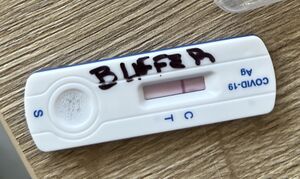COVID tests
This article is a stub. You can help the Personal Science Wiki by expanding it.
| Tool Infobox | |
|---|---|
| Related topics | |
Linked pages on this wiki |
Projects (1), |
COVID tests can identify whether an individual is currently infected with COVID-19. Such testing for infections continues to play an important role in managing the pandemic. There are different types of tests, mainly PCR tests – which are more sensitive but require access to a laboratory and equipment – and rapid antigen tests, which exist both in versions for use by professionals and for home-use.
Rapid antigen tests
Depending on the country, these tests can be widely accessible. For example, in France pharmacies and supermarkets sell home-use test kits containing 5 tests for around 15€. Furthermore, many pharmacies perform these rapid tests on the spot.
Most of these tests work by detecting an antigen SARS-CoV-2 (typically the viral nucleoprotein) through the use of antibodies that are present in the test-strip which is done via lateral flow immunochromatography. Virtually all of these tests exhibit two signals on the actual test strip, the actual test and a control signal, which indicates whether the test was loaded correctly.
In Europe these tests are currently not highly regulated as exemptions were made for getting them to market quickly.
